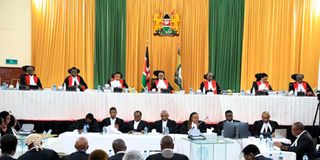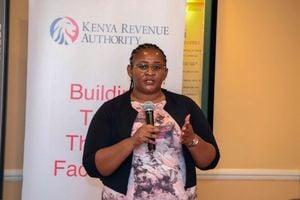Presidential poll battle a wake-up call to combat institutional capture

Supreme Court of Kenya judges during the hearing of the presidential petition at Milimani on September 2, 2022.
What you need to know:
- Will the verdict of the Supreme Court be accepted or will it be shunned, giving way to violent protests?
- If the court nullifies the election, who will run the repeat election? There is a risk that democracy will be put in cold storage until a new commission is constituted.
- Uncertainty looms large around abiding by the court’s ruling.
History repeats itself,” we are told, “because no one was listening to it the first time.”
A decade ago, rival factions in a politically divided electoral system declared opposition leader Alassane Ouattara, and the incumbent, President Laurent Gbagbo, as winners of the 2010 election in Côte d'Ivoire.
Institutional capture by rival political formations plunged the West African nation into a civil war, which only ended with the arrest of Gbagbo and the installation of Ouattara as President in 2011.
The Ivorian situation has eerie echoes in Kenya’s electoral dispute, now in the Supreme Court.
The trouble with Kenya’s 2022 presidential election is simply and squarely the failure by sections of Kenya’s power elite to genuinely respect the independence of institutions charged with managing elections.
Instead, the country has witnessed an intense scramble to capture and control Kenya’s Independent Electoral and Boundaries Commission (IEBC) to win or retain state power.
Conceptually, the “capture thesis” describes the corruption of authority – a political entity, policymaker or regulator – to serve, not public interest, but the commercial, ideological or political interests of individuals, a profession, ideological group, industry or private groups.
In Kenya, institutional capture is a lethal mix of ‘regulatory capture’, ‘cronyism’, ‘state capture’, ‘corruption’ and ‘abuse of power’.
This capture is weakening institutions, creating instability and rolling back democracy in Africa.
The events that precipitated the 2022 electoral impasse are now familiar.
On August 15, IEBC chairperson Wafula Chebukati declared Deputy President William Ruto the winner of Kenya's presidential election with 50.5 per cent of the vote to narrowly beat his rival, 77-year-old former Prime Minister Raila Odinga, who got 48.8 per cent of the vote.
The announcement split the commission and threw the entire electoral system into a vortex of the battle for the presidency now at the Supreme Court of Kenya.
Four of the seven members of the electoral agency called a press conference and declared that they “cannot take ownership of the result because of the opaque nature of this last phase of the general election”.
‘Mathematical absurdity’
The next day, August 16, the four dissenting commissioners addressed a press conference where they accused their chairperson of side-lining them and announcing results that were a ‘mathematical absurdity that defies logic’.
The commissioners reportedly wanted the chairperson to agree to modify results to push the election to a run-off.
Clearly, failure to announce results would have precipitated a constitutional crisis.
The division in the commission between the four new commissions and three members of the old guard badly undermined teamwork.
It would affect a run-off/repeat election should the court annul the results.
The splitting and stigmatising of the IEBC and its chairperson have also undermined its reputation.
Notably, minutes after the press conference of the dissenting commissioners, Odinga addressed the nation, rejecting the results as “null and void” and accusing Chebukati of “gross impunity”, “blatant disregard of the constitution” and “subverting the will of the people”.
He petitioned the Supreme Court to declare the IEBC chief unfit to hold public office. Meanwhile, he commended the four dissenting commissioners for their “heroism”.
The vilification and stigmatisation of Chebukati and the commission are not new.
Following Kenya’s return to the multi-party system in 1992, the Electoral Commission of Kenya (ECK), formed to manage the first multi-party election, and its chairperson, Justice Zacchaeus Chesoni, were greatly vilified especially by the opposition and accused of being under the thumb of the ruling Kanu.
Chesoni’s successor, Samuel Kivuitu, who presided over the 1997, 2002 and 2007 general elections and the 2005 constitutional referendum, died a heartbroken man.
A divided house
The successor to the ECK, the Interim Independent Electoral Commission of Kenya (IIEC), set up on May 7, 2009, with Ahmed Issack Hassan as its chairperson, was a divided house.
A well-orchestrated campaign of vilification of the chairman, commissioners and the IIEC through the media, which Hassan blamed on “some forces” who were bent on determining who would manage the 2012 elections, badly damaged the reputation of the commission.
There is absolutely nothing inherently wrong with the electoral commission. The problem is our politics and our political culture, the failure of sections of the political class to accept the outcome of elections and not respecting the verdict of democratic institutions.
Despite that, Kenya has come a long way since 2007, when the Orange Democratic Movement’s leadership rejected the idea of taking grievances to courts, and instead called for ‘a million strong’ campaign of civil unrest to overturn the results.
The Supreme Court is now widely accepted as an honest, impartial arbiter, a bastion of democracy and an ideal forum to audit Kenya’s democratic institutions and culture.
But will the verdict of the court tomorrow be accepted or will it be shunned, giving way to violent protests?
2022 is the third time Odinga is petitioning the court after losing a presidential contest.
In 2013, the court affirmed the victory of Uhuru Kenyatta. However, in 2017, Odinga was granted his request.
The court nullified Kenyatta’s victory and directed the IEBC to conduct a fresh election within 60 days, in strict adherence to the law.
But Odinga refused to participate in the election, throwing the country into a profound political crisis and uncertainty.
Can the court trust the petitioner this time to comply with its ruling?
Azimio is asking the apex court to remove the chairperson of the commission and declare him unfit to hold any office.
If the court nullifies the election, who will run the repeat election? There is a risk that democracy will be put in cold storage until a new commission is constituted.
Kenya and the world wait with bated breath for the ruling of the Supreme Court. But uncertainty looms large around abiding by the court’s ruling.
On August 27, the Azimio coalition called on its members to stage a peaceful seven-day vigil at the Supreme Court and IEBC offices countrywide.
Although the call was retracted, and supporters urged to remain calm, some fear there may be protests and clashes after the September 5 ruling.
The court battle for the presidency is a wake-up call to find strategies to combat ‘capture’ and forge strong, honest, impartial and fair democratic institutions.
Prof Kagwanja is a former Government Adviser and currently the Chief Executive at the Africa Policy Institute. He’s Adjunct Scholar at the University of Nairobi and the National Defence University (Kenya).





